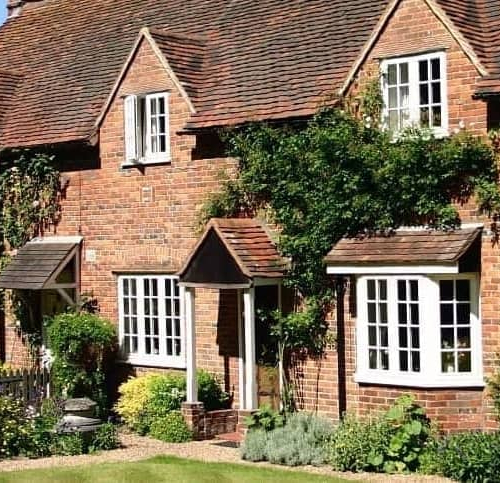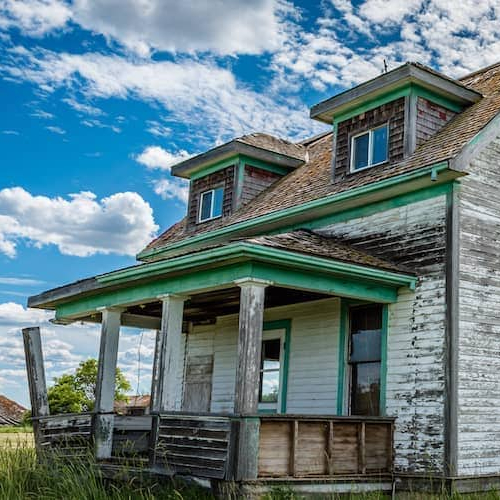Buying auction properties: What to know before you bid
Contributed by Karen Idelson
Aug 16, 2025
•10-minute read

Most people who buy a home make an offer directly to the current owner, let the owner review all the offers they receive, and hope that their offer is accepted. While this is the traditional way to buy a home, it’s not the only one.
In some cases, a home may be sold at auction. This gives buyers an opportunity to land a good deal, but there are risks involved, and you may wind up paying a good deal more than expected after making the purchase.
If you’re considering buying a home at auction, it’s important to understand why homes go up for sale at auction and what to keep an eye out for.
Why are some houses sold at auction?
Most homes are sold by their owners and listed through the Multiple Listing System (MLS). Auction sales usually happen as a last resort when a seller can’t sell their home another way.
Two common reasons for a home to sell at auction are after a property tax default or foreclosure, though with foreclosures trending down, the number of home auctions is also trending downward.
Foreclosure
If a homeowner can’t afford to make mortgage payments, their lender may foreclose on the property. Usually, lenders will offload foreclosed homes at auction, selling the property to recoup the money they lost.
The process usually looks like this:
- The homeowner becomes delinquent on their payments for at least 120 days
- The bank works with the owner to find alternatives to foreclosure, such as loan modification
- If no alternatives work and the homeowner remains delinquent, a date for the auction is set
- The home is sold to a buyer at auction, and the bank uses the proceeds from the sale to recoup lost loan costs
Property tax default
Property owners must pay property taxes to their local government. If the owner fails to make these payments for a period of time, a year or more in many jurisdictions, the local tax authority can sell the home at auction to recover the unpaid taxes.
Whoever offers the highest bid at auction gets to purchase the home. The previous homeowner does not see any proceeds from the sale until the unpaid taxes and any mortgage debts are paid off.
How do auctions work?
Home auctions can vary from place to place, but there are a few rules that are relatively universal. For one, you must be able to pay the amount you bid in cash. For another, sales are almost always final. You can’t back out of the deal once you make it.
Beyond that, auctions can follow different rules or formats. Some auctions may take place in person, while others are virtual. There may be a minimum price, or there may not be. Check with the organization running auctions in your area to get more information.
Types of auctions
The three main types of auctions used for real estate are absolute, minimum bid, and reserve auctions.
Absolute auction
An absolute auction is what most people think of when they hear the word auction. The property goes up for sale, and the highest bidder wins, with no minimum price or other restrictions.
With these auctions, a sale is guaranteed, which can draw a lot of interest. However, the seller might not get a good price because there’s no minimum price.
Minimum bid auction
A minimum bid auction starts at a set minimum price. While in an absolute auction, you could make a bid for as little as a single penny, in minimum bid auctions, the auctioneer will publish a minimum accepted price, such as $50,000 or $125,000, and all bids must be above that number.
This reduces risk for the seller but may mean the home does not sell at all.
Reserve auction
Reserve auctions are auctions subject to seller confirmation. After the auction, the seller has a period of time, often a few days, to decide whether to accept the highest bid or refuse to make the sale.
This offers the most security for sellers but is unappealing to buyers because there’s every chance they’ll spend the time on due diligence and making bids only for the buyer to decide to reject every bid. That can mean limited interest for these types of sales.
Types of bids
Bids at an auction can be either open (meaning public knowledge) or blind (meaning known only to the seller and bidder). Each has pros and cons.
Open
At open bid auctions, everyone knows what each other party has bid for the property. This creates an even playing field for buyers because each person knows exactly what others have bid and what price they’ll need to offer to be the highest bidder.
Blind
In a blind auction, bidders only know what they’ve offered to buy the home. Other potential buyers’ bids are private information. This advantages the seller, who may get lucky and have someone bid far more than the second-highest bid. It also advantages seasoned buyers who can better estimate how much to bid to be the winner.
How much should I bid?
Deciding how much to bid is possibly the most difficult part of buying a home at auction. A good bid can be the difference between getting a great deal on a home and overpaying for a bad property.
To decide how much to bid, you’ll have to do some legwork. Look at previous auctions and see what homes have sold for recently. Look at recently sold listings in the area to get a sense of the local market conditions.
Also, think about how many homes are up for auction. With more homes available, you may be able to get a better deal as demand is spread out across more properties. The fewer properties there are for sale, the more people may be willing to pay.
How to buy a house at auction: An example
This example will illustrate how buying a house at auction works:
- You’re looking to purchase a home in a neighborhood nearby and find out about a property auction.
- You see that the typical 2-bed/2-bath home in that neighborhood sells for about $450,000 and that there’s a 2-bed/2-bath home up for auction.
- You do some research on the property and estimate that you’d need to spend $50,000 to repair it and get it into good shape.
- You estimate how much you want to bid on the property based on recent sale prices and repair costs
- Bidding $350,000 would be relatively safe, letting you put in $50,000 for repairs and leaving $50,000 in profit margin after you sell the home
- If you’re confident in your repair estimate and potential sale price, you could bid slightly more
- If you expect repair costs could go over your estimate or think the market is weakening, you may bid even less than $350,000
- You attend the auction and submit a bid based on your estimated home price
Buying a house at auction: In person vs. online
Traditionally, home auctions have been in-person events, but evolving technology has made online auctions more popular. Each type of auction works slightly differently.
In person
In-person auctions are the traditional type of auction. The time and location of each auction are usually published in local papers or online. Interested buyers need to meet at the designated location on the scheduled date or time.
Usually, buyers will need to present proof of funds to show that they are capable of purchasing a property.
The auction then begins, following the preferred rules of the auction organizer. For example, at an open bid auction, the auctioneer will put a home up for sale, and potential buyers will stand and state their bid until no one is willing to outbid the previous person. At that point, the auctioneer declares the home sold to the highest bidder.
The buyer then needs to submit a payment or deposit and complete any necessary paperwork to complete the purchase.
Online
Many home auctions have moved online. Auction times and details are usually published online, and advance sign-up, as well as submission of proof of funds, may be necessary.
Online auctions usually have a larger buyer pool, so competition can be fierce. However, it can also make life easier for buyers because they can participate in multiple auctions easily without having to travel to different locations.
What are the advantages of buying a house at auction?
There are many reasons to consider buying a home at auction.
You may get the home at under market value
The primary reason to buy a home at auction is that you have a chance to get the property for much less than its market value. If you’re the highest bidder and meet the minimum price (if there is one), you’ll become the homeowner regardless of what you offered or what the home is worth.
This is good for investors who want to flip the property for a profit and people who want to live in the home. Either way, you’ve saved money.
It’s a good first investment
Real estate investors often have a large network of people who help them find good opportunities. If you’re new to real estate investing, you may not have that network that can help you find properties you could buy.
Buying a home at auction could be a good place to start, giving yourself an in to the industry.
What are the disadvantages of buying a house at auction?
Buying homes at auction is not without risk, so keep these drawbacks in mind.
Houses are sold as is
Homes sold at auction are usually distressed properties that the previous owner could not afford to keep maintained. You buy auctioned homes as is, so you could be buying a home that needs a lot of repairs, some of which you may not find until after you make the purchase.
You must have cash to make the purchase
Most auctions require that you pay in cash or with a cashier’s check. You can’t use a mortgage to finance the purchase upfront. That means you need a lot of capital to get started.
You’ll forgo common protections
When you buy a home the traditional way, you can include contingencies that protect you, such as an inspection contingency. The seller also has to disclose specific details about the home.
Neither of these things is true for auctions, so you’re missing out on some important protection.
The property could revert to the previous owners
Depending on local law, there are some cases where the previous owner can still retain ownership of the property.
For example, if the owner and the bank agree on a short sale or loan modification before you finish the paperwork, you might lose the home and all the time and effort you put into due diligence. The property is not legally yours until your name is written on the title of the house.
How can I finance the purchase of a home at auction?
With most home auctions, you need to have cash up front to be allowed to participate. However, there are still ways for investors to finance the purchase, which can be helpful for first-time investors.
Hard money loan
A hard money loan is a type of short-term real estate loan. These are usually offered by private individuals and companies rather than banks. They’re secured by the value of the property being purchased, and approvals are usually quick.
Rates can be high, and terms are short, so these loans are aimed at investors who want to flip the property rather than live in it.
Delayed financing
With delayed financing, you still need cash to buy the home up front, but you can later finance the home.
In effect, you use your cash to purchase the property. After making the purchase, you then go to a lender and get a cash-out refinance, getting a loan based on the home’s value. You can then use that money to finance repairs on the property or for other purposes.
Tips and tricks for buying auction homes
If you’re thinking about buying a home at auction, make sure to follow these tips. There’s no guarantee of success, but keeping these things in mind will help.
Know your limit
When participating in an auction, it’s easy to get excited and competitive. This can drive you to bid higher to make sure you win the property.
Staying calm and knowing your limit is key to getting a good deal. Estimate the home’s value, and the cost of repairs, and account for overages. Then, decide on your desired profit to arrive at your maximum bid, and be sure not to go over that number.
Do your research
Remember that with home auctions, the buyer is accepting nearly all of the risk associated with the home, from overpaying to covering the cost of repairs.
Make sure to do your due diligence and research each property carefully. If you’re not experienced, consider working with an agent to get a better understanding of comps in the area to help estimate the value of homes you’re interested in.
FAQ
Buying a home at auction is quite different from buying one using the typical process, so it’s important to understand what you’re getting into before you commit.
Is buying homes at auction a good idea?
Buying a home at auction can be a good idea, but it isn’t without pitfalls.
Auctions may help you get a great deal on a home by paying much less than its market value. However, you’re taking more risk. You could overpay, or you may buy a home that is in need of significant repairs and not have the protection of something like an inspection contingency.
Can I get help from a real estate agent?
Yes, it is possible to get help from a real estate agent, but it may be hard to find one that is willing to assist. Agents are compensated when they help people buy a home the traditional way, so an agent without a financial incentive may not be willing to help you buy a home at auction.
What if the home I bought at auction isn’t worth renovating?
When you buy a home at auction, there’s always the risk that it will require pricey repairs. In some cases, the repairs may be so costly that the home isn’t worth renovating. Ultimately, you may be forced to take a loss to offload the home.
The bottom line: Know what to expect before buying auction properties
Buying a property at auction could help you land a great deal and pay far less than the home is worth. However, auctioned homes are often distressed and in need of repairs, so be prepared to do some work or pay for renovations, and keep those costs in mind when settling on how much to bid.
If you’re thinking about buying a home, Rocket Mortgage® is here to help. You can start your mortgage application today so you’re ready to start touring properties and making offers.

TJ Porter
TJ Porter has ten years of experience as a personal finance writer covering investing, banking, credit, and more.
TJ's interest in personal finance began as he looked for ways to stretch his own dollars through deals or reward points. In all of his writing, TJ aims to provide easy to understand and actionable content that can help readers make financial choices that work for them.
When he's not writing about finance, TJ enjoys games (of the video and board variety), cooking and reading.
Related resources

5-minute read
Distressed property: Everything you need to know
A distressed property is a house that’s on the verge of foreclosure or has been reclaimed by a lender. Learn more about investing in distressed homes h...
Read more

9-minute read
A guide to first-time home buyer programs, loans and grants
If you’re a first-time home buyer interested in a loan or grant, there are several government programs to help you. Discover your options and see if yo...
Read more

7-minute read
Smart home: Definition, benefits, and the best smart home devices
Smart home technology lets you remotely control devices and systems in your home. Discover the advantages of a smart home and explore the top devices.
Read more